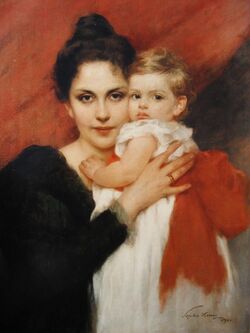Biography:Otto Klemperer (physicist)
Otto Ernst Heinrich Klemperer (1899–1987[1]) was a physicist expert in electron optics. He was granted his doctorate by the Humboldt-Universität zu Berlin in 1923.[2] His thesis advisor was Hans Geiger.[2] He continued to work with Geiger in the 1930s.[3]
Klemperer was co-inventor in 1928 of the Geiger-Klemperer ball counter,[4] "the first major advance in the design of proportional counters".[5] During the 1930s, he worked at the Cavendish Laboratory at the University of Cambridge on discrepancies between Fermi's theory of β-decay and the observed radiation properties of rubidium and polonium.[3] He was later an Assistant Professor and Reader in Physics at Imperial College, London,[6] where he wrote the third edition of his book on electron optics with Mike Barnett.[7]
The conductor Otto Klemperer was his father's cousin.[8] His uncle was the Romanist Victor Klemperer.
Bibliography
- Klemperer, Otto; Barnett, M.E. (1971). Electron optics. Cambridge monographs on physics (3 ed.). Cambridge University Press. ISBN 978-0-521-17973-7.
- Klemperer, Otto (1972). Electron physics: the physics of the free electron. Butterworths.
References
- ↑ Klemperer, Victor (2002). Deníky 1933-1941: Chci vydat svědectví. Litomyšl. p. 528. ISBN 978-80-7185-492-0. https://books.google.com/books?id=W8TjAAAAMAAJ&q=Otto+1987.
- ↑ 2.0 2.1 Otto Klemperer at the Mathematics Genealogy Project
- ↑ 3.0 3.1 Klemperer, O. (1935). "On the Radioactivity of Potassium and Rubidium". Proceedings of the Royal Society of London. Series A, Mathematical and Physical Sciences 148 (865): 638–648. doi:10.1098/rspa.1935.0038. Bibcode: 1935RSPSA.148..638K.
- ↑ Frame, PW (2005). "A history of radiation detection instrumentation". Health Physics 88 (6): 613–37. doi:10.1097/00004032-200506000-00008. PMID 15891457. https://zenodo.org/record/1234794.
- ↑ Ryan, Michael T.; Poston, Sr., John W. (2006). A Half Century of Health Physics: 50th Anniversary of the Health Physics Society. Lippincott Williams & Wilkins. p. 106. ISBN 0-7817-6934-5. https://books.google.com/books?id=qCebxPjdSBUC&pg=PA106.
- ↑ Chambers, William (1973). Chambers's encyclopaedia. 5. International Learning Systems. p. xiii.
- ↑ Smith, K. C. A.; B. C. Breton. "Sir Charles Oatley and the Scanning Electron Microscope: II. Research directed by W. C. Nixon". Advances in Imaging and Electron Physics. Elsevier. http://www-g.eng.cam.ac.uk/oatley/nixon.html. Retrieved 16 January 2011.
- ↑ Gay, Hannah (2007). "Imperial College during the Second World War". The history of Imperial College London, 1907-2007: higher education and research in science, technology and medicine. World Scientific. p. 261. ISBN 978-1-86094-709-4. https://books.google.com/books?id=x4u4ikoj1M8C&pg=PA261.


